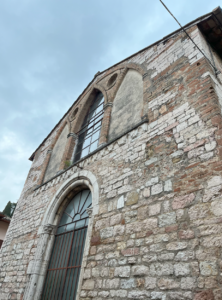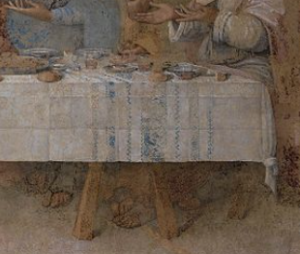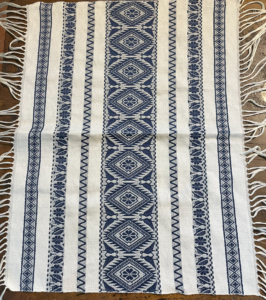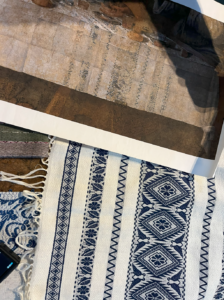Giuditta Brozetti Loom Workshop: Marta Cucchia
by Anna Radigan
On March 18th in Perugia, the students of the Fashion Mosaic visited Giordano Bruno School in the morning to receive a lesson on the art of weaving and how their curriculum requires their students to gain the skills necessary to handcraft! This morning at the high school provided an incredible understanding of how weaving works and its importance for generations of women in Italy. Later in the day, we visited the Giuditta Brozzetti loom workshop owned & run by Marta Cucchia (exterior view of the atelier, picture on the right), where our lesson in the morning had greatly impacted the way that we understood this art. Marta Cucchia showed us the complex looms from the 15th century that they preserve to continue this generational legacy of weaving. In this workshop with the few workers they have, weaving textiles is just one of the many parts of their business. Designing patterns for bags, tablecloths as well as other items, and additionally working with other small businesses keeps this ancient craft alive in the Umbria region of Italy.
understanding of how weaving works and its importance for generations of women in Italy. Later in the day, we visited the Giuditta Brozzetti loom workshop owned & run by Marta Cucchia (exterior view of the atelier, picture on the right), where our lesson in the morning had greatly impacted the way that we understood this art. Marta Cucchia showed us the complex looms from the 15th century that they preserve to continue this generational legacy of weaving. In this workshop with the few workers they have, weaving textiles is just one of the many parts of their business. Designing patterns for bags, tablecloths as well as other items, and additionally working with other small businesses keeps this ancient craft alive in the Umbria region of Italy.
One beautiful aspect I wanted to share from this experience is Marta Cucchia’s talent, knowledge of Art History as well as her incredible talent to recreate the tablecloth from the Last Supper. Being born in Perugia, she explained she grew up looking at the traditional motifs central to Perugia and has the ability to identify and recreate patterns. She explained that because of this skill, she recognized the Last Supper tablecloth as a traditional woven work from these weavers in Perugia in the 15th century. It was an aspect of history many people had forgotten or simply not acknowledged because it had come from a generation of women’s work. Taking this idea upon herself, Cucchia recreated the motifs she saw in the Last Supper tablecloth and created her own version (see pictures below).



Marta Cucchia revitalizes this craft as a way to preserve the history of women’s work in Perugia and additionally, continue generations of ethical productions with local materials and machines. She explains that the art of weaving continues to suffer tremendous losses as these domestic arts are tedious skills and take years of training in the modern age. I would love to dive into this topic of the lost art more, possibly in a final project for the Fashion Mosaic!
– Anna Radigan